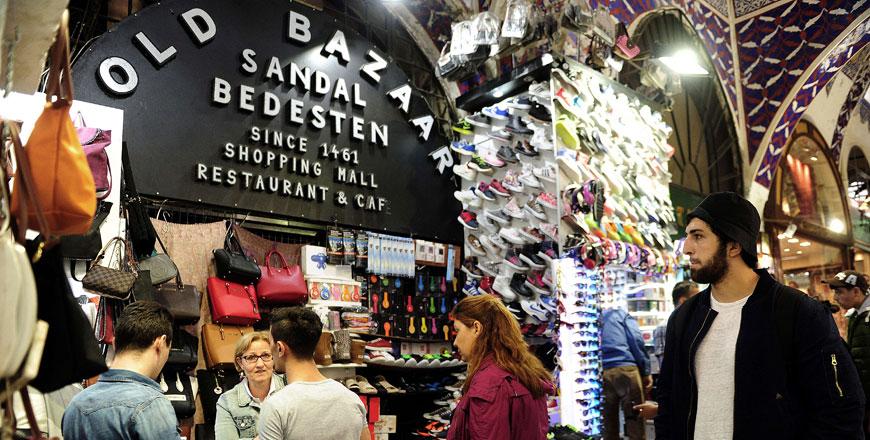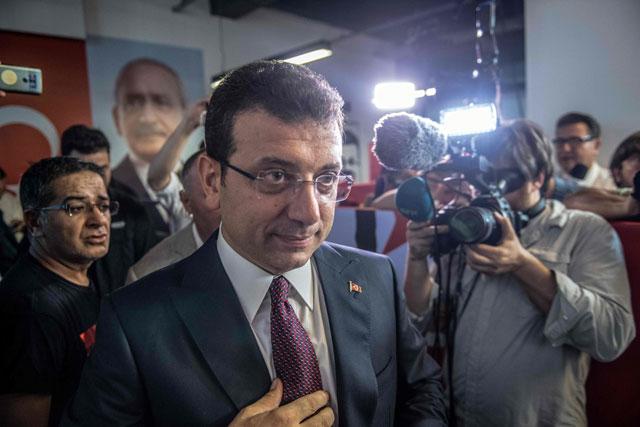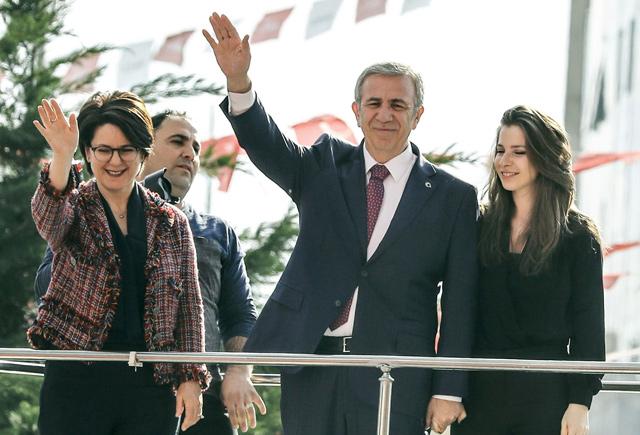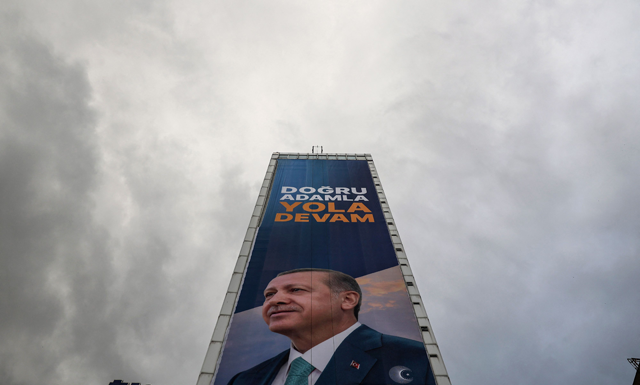You are here
In Istanbul's bazaar, discontent is brewing against Erdogan
By AFP - Jun 03,2015 - Last updated at Jun 04,2015

People walk past the blocked Sandal Bedesten gate (left) last week at historical Grand Bazaar in Istanbul (AFP photo)
ISTANBUL — In Istanbul's centuries-old Grand Bazaar, the hum of commerce is as noisy as ever. Vendors sell tea, coppersmiths craft their wares, merchants shout out to passing tourists.
But beneath this hubbub, discord is brewing against President Recep Tayyip Erdogan and the ruling Justice and Development Party (AKP) ahead of June 7 parliamentary elections.
The Grand Bazaar, home to some 4,000 shops where over 20,000 people work, has long been seen as a bastion of support for Erdogan and the Islamic-rooted AKP.
But as the economy starts to show weakness after years of impressive growth under Erdogan, who became president in 2014 after more than a decade as premier, there are growing signs that this support is beginning to wane.
"I used to vote for AKP but it's time for a change now. They have been in power for too long. I think they are burnt out now," said Huseyin Kaya, a silver shop owner who has worked in the Bazaar for two decades.
"The economy is not good. Business is bad. I have bought merchandise for tens of thousands of dollars and I have debts now that I cannot pay back," he added.
Many of the shopkeepers and small-scale manufacturers who have thrived under the AKP's rule voted for political stability and rewarded Erdogan for the country's growing prosperity, even after a corruption scandal and anti-government protests in 2013.
But the party is entering an election under fire over Turkey's economic performance for the first time since it came to power in 2002 due to stalling growth, stubbornly high inflation and unemployment.
'Spitting in our face'
The bazaar was the scene of protests last month by shopkeepers who refused to vacate their stalls in Sandal Bedesten, a section of the 15th century shopping area, following a notice calling for the immediate eviction of some 80 shops.
The shopkeepers locked themselves in their shops, shouting anti-government slogans, before riot police stormed the area, evicting all the shops in Sandal Bedesten and briefly detaining some 20 shopkeepers.
The tenants say that Fatih Municipality, run by the AKP, had leased their shops for a higher rent to a single tenant "to cover the costs of the restoration" of the Grand Bazaar, which hosted a motorcycle chase scene in 2011 in the James Bond movie "Skyfall" that caused damage to the structure.
There are rumours that the shops could be converted into hotels as part of an ambitious project by the municipality.
"The government is just spitting on our face. I don't believe in any of them anymore. I'm not going to vote for AKP because we are in a grave situation here," said Mustafa Kahraman, a cloth merchant.
"They've clearly demonstrated they are there to serve mainly the rich and powerful," he added outside a square where his shop was located, now deserted.
Huseyin Kaya, a board member of Grand Bazaar Association of Shopkeepers, agreed: "All the government cares about is money. Is there anything they haven't sold yet?"
"People in our community used to vote for the AKP when they stood for something. But they have held the reins too long and the corruption and undemocratic behaviour is now shining through," he said.
'No economic miracle'
Turkish economist Mustafa Donmez said "there is no economic miracle anymore" for the AKP's core voters, who until now supported the party over "bread and butter issues".
"The AKP has not much left to give them. The economy is very fragile and the future rates of growth will no longer be enough to create jobs for their children," he added.
"When the economy is going bad, they start to question whether the government is really corrupt, whether the officials really stuffed their pockets full and whether there is really a lack of freedom in the country," he indicated
Erdogan is hoping the AKP will win a two-thirds majority in the polls in order to change the constitution and boost his office's powers to that of a US-style executive president.
The latest opinion polls, however, suggest the AKP's support could fall sharply from the almost 50 per cent of the vote it garnered in 2011, with it possibly even losing its parliamentary majority.
But Selvi Gurey, who owns a souvenir shop in the bazaar, says he will vote for the AKP because he thinks a presidential system will bolster stability and economic growth.
"We owe a debt of gratitude to Erdogan, who has worked so tirelessly to make our life better. I think Turkey will be better off with a stronger president," he said.
Separately, Turkey's agriculture sector, a key pillar of the domestic economy, is increasingly feeling the pinch in a troubling development for the ruling party that is counting on farmers' support in this weekend's legislative elections.
On a cattle farm in the district of Cubuk outside Ankara, Ozkan Ilhan surveys his 500 cows with pride but declares that the future of the sector is in danger under the policies of AKP.
"Our economy is not going well at all. The AKP is not coping, it is carnage. If that continues it will be the end of the agricultural sector in our country." he says. "We are obliged to import agricultural products from abroad."
Such attitudes are bad news for the AKP which has smashed the opposition in Turkey's last three parliamentary elections and is seeking a two-thirds majority this time so it can make changes to the constitution.
Traditionally conservative, Turkish farmers helped the AKP come to power almost 13 years ago and their support has helped the party to maintain its grip ever since.
But now with growth dipping under three per cent and unemployment on the rise, the AKP is finding its support eroding and farmers have been among the first to vent their frustration.
Farmers and agricultural workers complain of a lack of policies aimed at helping local producers as well as an increase in charges.
For the first time, the price of fuel oil, which is widely used in the agricultural sector, has been a major election theme with the opposition promising to push prices down to 1.5 lira ($0,56) per litre from 4 lira.
The head of the opposition Republican People's Party (CHP) Kemal Kilicdaroglu told AFP that 2.7 million hectares of agricultural land have been allowed to go fallow under the AKP's rule.
"It's lamentable," he said.
'Farmers the first victim'
The agricultural sector is of huge importance for the country, employing one in five Turks. But there is immense room to improve its productivity and efficiency and it only accounts for nine per cent of the gross domestic product.
And even if there have been improvements in mechanisation, it remains well behind European production levels.
Turkey is obliged to import quantities of food that it can produce itself, including barley wheat and cotton.
"We must all accept that Turkey is a major producer even if it is importing for the needs of a population of 76 million people," said Ali Ekber Yildirm, a journalist that specialises in agricultural affairs.
But he added: "One after another, state enterprises have been privatised. Prices in the sector are fixed by multinational companies. These companies have become quasi-monopolies in a strategic sector”.
He said that in general the Turkish leaders in Ankara pay little attention to what farmers have to say. "They know that most of them will vote for them under all conditions. They think they have them in their pockets for the elections."
Agriculture Minister Mehdi Eker has vehemently defended the government's record, saying that since 2010 it has handed out some 10 billion lira in subsidies for agricultural producers.
"This has never been done before in Turkey. This shows our particular interest in our agriculture," he said.
But the boasts are far from impressing everyone.
"These subsidies go mainly to people close to the ruling party," says Abdullah Aysu, a farmer from the Ankara region of Haymana who leads a trade union for farmers and pushes to give them greater rights.
"Farmers are the first victims of an economy that is on the way down and are then obliged to give up. Some 1.5 million farmers left their farms since the AKP came to power in 2002. One farmer in two has gone bankrupt," he indicated.
He said: "Our catastrophe will be that of the consumer."
Related Articles
ISTANBUL — Turkish President Recep Tayyip Erdogan suffered a major blow on Sunday as the opposition candidate in Istanbul's controversial ma
ISTANBUL — Turkish President Recep Tayyip Erdogan's AKP on Tuesday appealed against results in Istanbul and Ankara following a weekend elect
ISTANBUL — A feminist voice rings out from behind the mounds of strawberries and olives in an Istanbul bazaar: "Let's get rid of Erdogan!""D



















